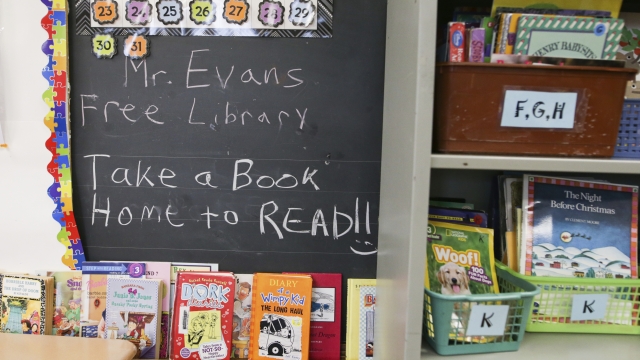On National Read a Book Day, Kasey Meehan of PEN America’s Freedom to Read initiative continues to be alarmed at the number of books being taken off of America’s school library shelves.
"We saw over 1,400 instances of book bans, and that swept up over 800 unique titles. When we think about 800 unique books that are being targeted and removed from access, it's just an immense, it's a huge number," said Meehan.
She is referring to book ban figures from the last school year, which PEN America has been tracking. Meanwhile, in some places, public libraries have been threatened with closure for carrying titles touching on race, sex, and LGTBQ+ themes.
"What does it mean when you can't see yourself in literature? What does it mean when you can't read a book about somebody who has a different lived experience than yourself? I mean, there's a real gap in how individuals will be able to kind of navigate and engage and explore, different either identities or experiences or histories," said Meehan. Judy Newman is the chief impact officer at children’s books publisher Scholastic. She says the discourse surrounding books and libraries is unfortunately coming at a time when standardized reading scores for 13-year-olds have dropped to their lowest level since 2004.
"Listen, if you don't wanna read a book, I'm not gonna force you to read it, but I don't want you to prevent me from choosing it. We take that away by closing libraries or other places where kids can choose. We're doing them a disservice. It's just one more negative thing," said Newman.
SEE MORE: Rising book bans in US make school libraries political battlegrounds
Aside from the discourse on banned books, another hurdle to academic success is children not getting access to books due to low resources at home and in schools.
"They provide access and equity — what we really mean by equity, when every kid in the school can participate equally," said Newman.
Book choice is one of the most important factors in getting children to read. According to Scholastic’s data, 93% of children say their favorite books are the ones they pick out themselves, and 92% say the books they’re most likely to finish are the ones they choose.
Books can be expensive — that’s why Scholastic is pairing up with the Scripps Howard Fund’s "If You Give A Child A Book" campaign.
"It's really important to flood the books to each child. You know that essentially they're living in a book desert, so we wanna make sure that they have access to books within their home," said Meredith Delaney, the director of philanthropic strategies for the Scripps Howard Fund.
The campaign brings free scholastic book fairs to Title 1 schools, school where most kids are on free or reduced lunch programs. The goal: Give each child 10 free books to build up their at home libraries.
"Research shows that 10 is that magic number, 10 is the number of books that a child needs each year to build their home libraries. And it means that it's a number that has a positive correlation with their reading comprehension and their reading scores," said Delaney.
"It takes a village, right? The teachers, principles, administration, caregivers, the families to envelop that child in reading and encouraging them to see themselves as a reader," said Newman.
Trending stories at Scrippsnews.com





